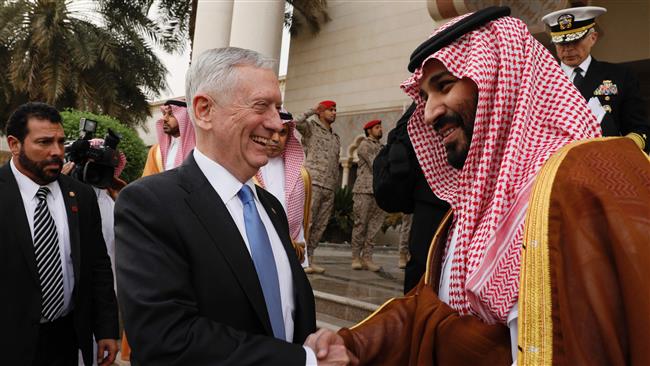
RNA - Officials said Washington, in return, wants new commitments from Riyadh to minimize civilian casualties in Yemen.
"We want the Saudis to show that they are committed to use these things properly," a US official told Reuters on condition of anonymity.
A second official, however, suggested that the request for additional safeguards was just a formality. "This is an unconditional sale. There are no conditions attached. The decision has been made to let the sale go through."
The Trump administration notified Congress last month that it wanted to sell about $390 million worth of guidance systems to Saudi Arabia.
The systems, manufactured by Raytheon Co., are designed to convert “dumb” bombs into precision-guided munitions that are supposed to hit targets more accurately.
During a two-day trip to Riyadh this week, US Defense Secretary James Mattis called for a “political solution” to the conflict in Yemen that has lasted for more than two years.
Even as Mattis was meeting with members of the Royal family, US officials suggested that military assistance was also needed to help bring an end to the war.
An announcement of the new weapons sale had been expected last month, but objections from some members of Congress and human rights groups complicated the matter.
A group of US senators introduced legislation earlier this month to set new conditions for US military assistance to Riyadh.
"The Saudis are important partners in the Middle East, but they have continued to disregard our advice when it comes to target selection and civilian protection," Sen. Chris Murphy, a Democrat from Connecticut, said in a statement.
The US support for the Saudi military campaign in Yemen—which includes arms sales, aerial refueling and providing intelligence—has long been controversial.
Human rights groups have repeatedly accused the Saudis of causing civilian casualties, notably through airstrikes on schools and hospitals. The bombing campaign has claimed the lives of more than 12,000 people, most of them civilians.
Amnesty International’s researchers have already found unexploded US-made bombs among the ruins of residential buildings in Yemen.
Trump's predecessor, Barack Obama, put the arms sale on hold in December amid international outrage over the high civilian toll in Yemen. The suspension came after an estimated 140 people were killed the month before when Saudi jets targeted mourners at a funeral in the capital, Sana’a.
In a report published Thursday, two child advocacy groups—Save the Children and Watchlist on Children in Armed Conflict— urged the United Nations to put Saudi Arabia on its list of violators of child rights.
The report said the Saudis had blocked aid, creating a situation where the number of severely malnourished children has tripled since before the war.
The kingdom launched the offensive in March 2015 to push back the Houthi Ansarullah movement and reinstate the regime of Yemen's former president, Abd Rabbuh Mansur Hadi, who is a staunch ally of Riyadh.
847/940